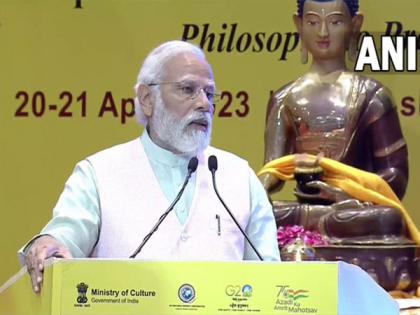India marches peacefully on Buddhism path
By ANI | Published: May 12, 2023 12:55 AM2023-05-12T00:55:43+5:302023-05-12T01:00:04+5:30
New Delhi [India], May 12 : As the government of India is keen to strengthen the people-to-people linkages weaved ...

India marches peacefully on Buddhism path
New Delhi [India], May 12 : As the government of India is keen to strengthen the people-to-people linkages weaved through the common thread of Buddhism, Indian ambassador to the United States, Taranjit Singh Sandhu, recently said that Buddhism is among the "greatest gifts" of the country to the world.
"Buddhism is amongst the greatest gifts from India stretching back to more than 2500 years and it's practiced in more than 100 countries today. It's a strong unifying factor. I have learned in my previous assignment in Sri Lanka and witnessed how strong our shared Buddhist heritage is," he said.
In 2017 Indian Prime Minister Narendra Modi visited Sri Lanka as the chief guest of the UN International Vesak Day celebrations. Several initiatives since then have been taken like the development of the Buddha circuit in India and Nepal.
The rejuvenation of pilgrimage centres like Sarnath and Kushinagar, the inauguration of Kushinagar International Airport, the International India Center for Buddhist Culture and Heritage in Lumbini with the cooperation of India and the International Buddhist Confederation, assistance to several countries in India's neighbourhood, Southeast Asia for construction and renovation of Buddhist monasteries and joint projects to be set up, international centres and museums for Buddhist culture and heritage are just a few examples of India's efforts.
Recently India orgsed The Global Buddhist Summit a two-day congregation in the national capital is a first-of-its-kind event.
Hosted by the International Buddhist Confederation in collaboration with the Indian Ministry of Culture, it saw the participation of delegates from nearly 30 countries, including Taiwan, Myanmar, Thailand, Vietnam, Sri Lanka, and Mongolia.
Monks, scholars and heads of Buddhist orgsations from these countries attended the event in Delhi, but none from China home to the world's largest Buddhist population were present.
Contrary to speculation, the 14th Dalai Lama attended the event and gave an address emphasising the importance of Buddhist philosophy and values.
Through Buddhism, which originated in India, New Delhi shares deep cultural and historical roots with many of the countries in Asia. The government has pitched the event as a bid to "mark the significance and importance of India in Buddhism", and a "medium to enhance cultural and diplomatic relationships with other countries."
The Global Buddhist Summit comes at a time when India holds the presidencies of the G20 and Shanghai Cooperation Orgzation (SCO), and is keen to be a voice for the Global South.
According to an article in World Economic Forum, Buddhism's potential utility in foreign policy is derived to a large extent from the manner in which the faith was revived following the Second World War.
The revival had a decidedly internationalist outlook and focused on crossing extant sectarian and geographical boundaries.
This was facilitated by the foundation of a number of orgsations and the convening of numerous councils and conferences in the decades after the war that emphasized transnational cooperation between the various Buddhist sects.
It is within this context that one can understand the efforts of the Indian government to incorporate Buddhist heritage to form a basis for further diplomatic, economic, cultural, and strategic associations within its foreign policy.
The established transnational network for Buddhism, and the important role played by the faith in the lives of millions across the world, is what gives it potential for Indian foreign policy.
The pan-Asian presence of the religion and its importance for national identities in the region, coupled with its image as a peaceful religion makes it ideal for soft power diplomacy, with its focus on non-coercive power.
Disclaimer: This post has been auto-published from an agency feed without any modifications to the text and has not been reviewed by an editor
Open in app